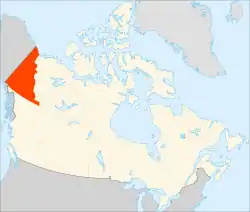Higher education in Yukon
Higher education in Yukon is shaped by the territory's small population (40,717 people as of Dec. 2018)[1] in a relatively large geographic area. The history of higher education went hand in hand with the establishment of a representative territorial government in 1979.[2] Yukon University is the only higher education institution in Yukon. Yukon University issues certificate, diploma, and degree programs. In December, 2019, the Yukon Legislature passed a bill that would transform Yukon College into Yukon University.

History
Although the Yukon University wasn't formally established until 1988 by the College Act, 1988,[3] its predecessor, the Whitehorse Vocational Training School (later to become the Yukon Vocational and Technical Training Centre),[4] opened in 1963 with a focus on teaching skills that enabled adults to gain employment.[5] In 1977 the territorial government made arrangements with the University of British Columbia to offer a one-time university-level Yukon Teacher Education Program.[6]
The birth of Yukon University in 1983 was due to public demand for further education and training opportunities within the territory.
In 2007, and as part of Yukon University, the Yukon School of Visual Arts was established to provide the foundational year of a Bachelor of Fine Arts (BFA) or a Bachelor of Design (BDes). The school is a partnership between Dawson City Arts Society, Yukon University and the Tr’ondek Hwech’in and its credential is conferred by Yukon University. Governance comes from all three partners and funding comes from the Yukon Government. Articulation agreements are in place with ECUAD, ACAD, OCAD, and NSCAD.
In December, 2019, the Yukon Legislature passed a bill that would transform Yukon College into Yukon University.
Structure and governance
Yukon University governance
"The board of governors of Yukon University holds fiduciary responsibility for the institution and management of the operations, including policies that relate to quality assurance. The Yukon College Act also establishes campus advisory committees to advise the board of governors on the programs and activities of the community campus, with particular reference to the needs of the community. The board of governors is accountable to the minister of education. The minister tables the board's report with the Legislature."[7]
Future directions and challenges
Yukon University is a founding member of the University of the Arctic, "a cooperative network of universities, colleges, research institutes and other organizations concerned with education and research in and about the North."[8] Preparations for university transition have been underway since 2012[9] and more formally since somewhat before 2015 with an anticipated launch date of Spring 2020.[10] This is despite the fact that northern residents and southern academics have been suggesting it since the early 1960s,[11] an attempt was made to establish a university in Yukon and the Northwest Territories in the 1970s,[12] the Science Council of Canada urged its establishment as early as the mid 1970s,[13] and Yukoners have proposed the college become a university in some form or other since 2004.[14] In December, 2019, the Yukon Legislature passed a bill that would transform Yukon College into Yukon University. The university officially opened in May, 2020, making Yukon University the only public university in the north.
See also
Notes
- BC Stats. (2007). "2006 Census Profile:Yukon Territory" Retrieved July 15, 2008
- Senkpiel, Aron. (1997). Postsecondary Education in Yukon. In "Higher Education in Canada" (pp. 285 - 300). Ed. Jones, G.A., New York, N.Y.: Garland Publishing
- "COLLEGE ACT", O.I.C. 1988/166 Retrieved on July 17, 2008
- Yukon College. (n.d.). "Our History" Retrieved April 16, 2018
- Dennison 1995, p. 90
- Senkpiel, Aron. "An Unlikely Alliance: The Yukon Teacher Education Programme, 1978-82." Unpublished paper. n.d.; Eastmure, Lori Patterson. "Honouring the Past, Touching the Future: Twenty-Two Years of Aboriginal Teacher Education in the Yukon." The Northern Review, No. 34 (Fall 2011): 35-60. Available from http://journals.sfu.ca/nr/index.php/nr/article/view/206"
- Canadian Information Centre for International Credentials. (n.d.) "Quality Assurance Practices for Postsecondary Institutions in the Yukon" Retrieved July 15, 2008
- Poelzer, Greg. (2007). "The University of the Arctic: From Vision to Reality." The Northern Review 27 (Fall): 28-37.;About UArctic (n.d.). Retrieved April 18, 2018; Yukon College. (n.d.). "University of the Arctic" Retrieved April 16, 2018
- Dolphin, Myles. (2015, December 9). "Yukon College scouted Scandinavia for university research." Yukon News.
- Yukon University Timeline
- Graham, 2015.
- Graham, Amanda. (1994). "Not a Perfect Solution but a Good Illustration: The Life and Times of the University of Canada North, 1970-1985." The Northern Review 12/13: 117-132; Graham, Amanda. (1994). "The University that Wasn't: The University of Canada North, 1970-1985." MA thesis. Lakehead University, Department of History.
- Science Council of Canada. (1976). "Northward Looking – A Strategy and a Science Policy for Northern Development." Report No. 26. Ottawa: Science Council of Canada.
- Easton, Norm. (2004, February 9). "Norm Easton – Views on a Yukon University." CBC News. [transcript Retrieved April 18, 2018]; Querengesser, Tim. (2006, August 24). "Yukon U revisited." Yukon News.
References
- Dennison, John (1995), Challenge and Opportunity: Canada's Community Colleges at the Crossroads, Vancouver: UBC Press, ISBN 978-0-7748-0516-2.
- Macdonald, Dawn (August 10, 2007), Yukon College: Environmental Scan 2007 (PDF), Yukon College, retrieved 2008-09-27.